| Srl | Item |
| 1 |
ID:
186372
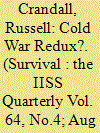

|
|
|
|
|
| Summary/Abstract |
In The Twilight Struggle, diplomatic historian Hal Brands urges readers to revisit Cold War history to gain vital insights and lessons regarding the United States’ unfolding geopolitical and ideological competition with Russia and China, which he sees as unfolding in the ‘no-man’s land between peace and war’. The author does not believe that the Cold War is a perfect facsimile of today’s fraught global environment, but the struggles of the twentieth century are nonetheless startlingly similar, not least because the threats of failure, decline and even annihilation are as acute today as they were then. Brands’s timely book details the strategies employed by America’s Cold Warriors in their contest with the Soviet Union, suggesting that they remain relevant today. The question is whether the United States and the West are willing and able to heed the author’s warning and act accordingly.
|
|
|
|
|
|
|
|
|
|
|
|
|
|
|
|
| 2 |
ID:
186371


|
|
|
|
|
| Summary/Abstract |
Jimmy Carter is often accused of ‘losing Iran’. It may therefore come as a surprise that no American tried harder to forestall the Iranian Revolution than Carter. The increasing availability of archival evidence reveals that Carter tried to press Shah Mohammad Reza Pahlavi, who was reluctant to act, to restore order. Carter even contemplated a military coup to prevent the assumption of power by revolutionary leader Ayatollah Ruhollah Khomeini. None of this worked, because America’s allies were too fickle and its adversaries too determined. Carter was ultimately guilty not of ‘losing’ Iran, but of misunderstanding it.
|
|
|
|
|
|
|
|
|
|
|
|
|
|
|
|
| 3 |
ID:
186367
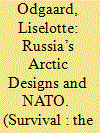

|
|
|
|
|
| Summary/Abstract |
The war in Ukraine has made Russia’s Arctic strategy of developing the Northern Sea Route more important. Moscow and Beijing share interests in redirecting Russian energy and mineral exports towards China and expanding infrastructure along Russia’s Arctic coastline to connect the Northern Sea Route with China’s Polar Silk Road. Chinese investments and technology are necessary to realise the sea route’s commercial potential and protect Russia’s Arctic security interests. Supply lines between North America and Europe traverse the High North. China is supporting a strengthened Russian defence posture by expanding cooperation on intelligence, surveillance and reconnaissance. This will help Russia challenge NATO along both China’s coastline and Russia’s borders with NATO. Accordingly, NATO needs to devise a strategy that recognises the interdependence of its eastern and northern flanks.
|
|
|
|
|
|
|
|
|
|
|
|
|
|
|
|
| 4 |
ID:
186368
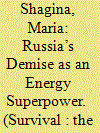

|
|
|
|
|
| Summary/Abstract |
Russia’s status as an energy superpower is waning. While Moscow is raking in short-term gains from record-high energy prices, it stands to bear long-term losses. Western sanctions, the European Union’s energy transition and Russia’s limited pivot to Asia will have profound implications for the country’s oil and gas industry. Since the Cold War, Russia’s energy sector has been tied to Europe. Moscow exported hydrocarbons to the West in exchange for Western capital and advanced technology. The war in Ukraine has forced Europe to wean itself off Russian fossil fuel and accelerate its energy transition. Russia’s energy decoupling from the EU will affect the structure of the state budget and alter the fabric of the Russian economy. The country’s pivot to Asia can only partially offset Europe’s decision to cut out Russian hydrocarbons. Furthermore, Moscow will become ever more reliant on Beijing, exacerbating their already asymmetrical relations.
|
|
|
|
|
|
|
|
|
|
|
|
|
|
|
|
| 5 |
ID:
186365
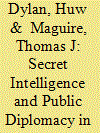

|
|
|
|
|
| Summary/Abstract |
Intelligence is generally collected and used in secret to inform internal audiences. Before and after Russia’s invasion of Ukraine, however, the UK and US governments have deployed intelligence extensively to influence external audiences, both publicly and privately, regarding Russian intentions, capabilities and practices, and the consequences of Russian actions. While the scale, manner and initially pre-emptive nature of these disclosures represent a significant evolutionary step in how liberal-democratic governments use their intelligence assets, current practice has built upon historical precedents. This article examines why states choose to use intelligence – including fabricated intelligence – for influencing external audiences; the different methods they deploy for doing so; the gains and costs of publicising intelligence; and how the use of intelligence during the Russia–Ukraine conflict should be understood within broader historical and contemporary trends. The authors conclude that while liberal democracies’ use of intelligence in public is to be welcomed for its greater transparency, careful risk management will be needed if this approach is to continue.
|
|
|
|
|
|
|
|
|
|
|
|
|
|
|
|
| 6 |
ID:
186370
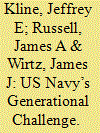

|
|
|
|
|
| Summary/Abstract |
Technological, social and environmental developments are producing changes at such a rate that they threaten to overwhelm the ability of individuals, societies and governments to adapt. The pace and impact of this technological churn is especially difficult for the US Navy because of the long time frames involved in traditional navy planning, acquisition and personnel cycles. The US Navy should prepare to ride succeeding waves of techno-strategic change – particularly the ‘robotics wave’ – and apply the rules of strategy in thinking about the role of technology in war at sea.
|
|
|
|
|
|
|
|
|
|
|
|
|
|
|
|
| 7 |
ID:
186364
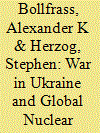

|
|
|
|
|
| Summary/Abstract |
The global nuclear order had been challenged in recent years by individual proliferators, the moribund US–Russian arms-control process and resultant frustration over stalled progress towards disarmament. Then Russia launched its full-scale invasion of Ukraine under cover of nuclear threats against NATO. This has neither exposed the international nuclear-governance regime as toothless nor brought it to the verge of collapse. The global nuclear order’s history shows its resilience to rogue acts by great powers. It will continue to serve key nuclear-capable states’ security and energy interests in the non-proliferation domain. Arms control between Washington and Moscow has always been sensitive to their strategic whims and can be reconstituted. The main consequence of Russian President Vladimir Putin’s war is renewed public awareness of the often unpalatable role nuclear weapons play in international politics. Nuclear targeting, deterrent threats and associated risk-reduction efforts are hardly new phenomena.
|
|
|
|
|
|
|
|
|
|
|
|
|
|
|
|
| 8 |
ID:
186369


|
|
|
|
|
| Summary/Abstract |
European monetary policymakers face tough choices regarding the inflation and uncertainty fuelled by the war in Ukraine. They need to bring an end to the large-scale asset purchases and negative interest rates that have been the bulwarks of monetary-policy accommodation since 2015. They must also ensure that European monetary policy can be applied across countries while holding down the differences in sovereign borrowing costs between those governments that are financially strong, such as Germany, and those that are in a weaker position, such as Italy. Any solution to the problem of widening borrowing costs that is consistent with fighting inflation will impose losses on the central banks of stronger countries, while making it cheaper for those governments that receive support to borrow. Whatever it decides, the European Central Banks’s Governing Council does not have to be political to be perceived by the European public as making a political choice.
|
|
|
|
|
|
|
|
|
|
|
|
|
|
|
|
| 9 |
ID:
186366
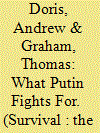

|
|
|
|
|
| Summary/Abstract |
Russia’s invasion of Ukraine has reignited debate over the role of NATO expansion in producing the current crisis. Robert Person and Michael McFaul dismiss Russian President Vladimir Putin’s NATO concerns as a ‘fiction’, arguing that it was actually the expansion of democracy that threatened his autocratic regime. This argument draws a false distinction between trends Russians view as deeply entwined. Democracy and NATO expansion were not separate issues for Putin and the Russian elite, but mutually reinforcing elements of a concerted Western effort to contain Russia’s ambitions as a great power. Putin’s distaste for democracy does not overshadow but rather reinforces his objections to NATO. Because NATO expansion played an important role in producing the invasion, halting that expansion might have persuaded Putin to pursue his goals through less violent means.
|
|
|
|
|
|
|
|
|
|
|
|
|
|
|
|